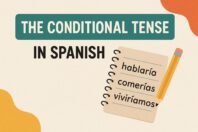Por vs Para: The Only Explanation You Need

Get our free email course, Shortcut to Conversational.
Have conversations faster, understand people when they speak fast, and other tested tips to learn faster.
More infoPor vs Para is a common point of confusion for Spanish learners.
On a basic level, you probably know that both words mean “for” – however, they are used completely differently.
Let’s take a look:
- I bought a cake for you – Compré un pastel para ti
- I came to the event for you – Vine al evento por ti
You can see how both are used differently.
Para is a straight line, that always has a final destination. In the above example, the cake is for you.
Por can be a movement, or non-specific direction for an action (I passed by the school), but also describes the reason or motivation for doing the action. In the above example, the person came to the event for you.
Of course, both words are used for more than “for”, as we’ll explain in this post.
How To Use Por
Por is used as ”for” when referring to non-specific places, time, money you spend, and also means of transportation, communication, substitution or exchange.
Of course, as you’ll see below, por doesn’t always directly translate as “for”.
(this will make more sense once we review examples)
| Use | Por in English |
| To talk about time | For, during, per |
| Reasons | For, because of |
| Movement, means of transport and communication | By, on, through , across |
| Substitution | For, in exchange of, instead of |
| Nearby location | Around, in (a place) |
| Non specific routes | Through, around |
Remember, we use por when we want to be nonspecific – whether it’s a movement, mode of transport, location (streets and places), the time you spend in a place, the money you pay for things, or what you use to communicate with people.
- Is there a bookstore around here? – ¿Hay una librería por aquí?
- We walk with our dog through the park – Caminamos con nuestro perro por el parque
- I’m looking through the window – Estoy mirando por la ventana
Additionally, por also describes the reason, or motivation behind an action.
- I study piano for my father. He feels very happy when he hears me play it – Yo estudio piano por mi padre. Él se siente muy feliz cuando me oye tocarlo
Now, an example with both por and para.
- It is important to learn other languages, so I study spanish in Baselang to get a promotion in my job – Es importante aprender otros idiomas, por eso yo estudio español en Baselang, para tener un ascenso en mi trabajo
In the above example, I use por to state a reason and para to state my specific goal (a promotion).
Finally, let’s look at eight different scenarios where you can use por.
1) To talk about money:
- How much did you pay for those shoes? – ¿Cuánto pagaste por esos zapatos?
- I paid $5 for that coffee – Yo pagué $5 por ese café
- I’ll give $30 for that sofa – Te daré 30 por ese sofá
2) To describe a reason or motivation for doing something:
- I take dance classes for fun – Yo tomo clases de danza por diversión
- We work for money – Nosotros trabajamos por dinero
- I like you for the nice way you treat all people – Me gustas por la forma tan agradable en que tratas a todas las personas.
3) To replace something:
- Can I change this newspaper for this magazine? – ¿Puedo cambiar este periódico por esta revista?
- I need to change this shirt for a smaller size – Necesito cambiar esta camisa por una talla más pequeña
- Anna is still sick, so the substitute teacher will give the class for her – Ana todavía está enferma, entonces el profesor sustituto dará la clase por ella
4) To talk about an approximate or nonspecific place:
- Do you want to go for a walk around the mall? – ¿Quiéres ir a caminar por el centro comercial un rato?
- I think her house is somewhere around downtown – Creo que su casa está en algún lugar por el centro
- The bathroom must be around here – El baño debe estar por aquí
- I’m looking through the window – Estoy mirando por la ventana
5) To talk about frequency or period of time:
- I have dance lessons twice a week – Tengo lecciones de danza dos veces por semana
- I went to Brazil for 3 weeks – Fui a Brasil por 3 semanas
6) To talk about parts of the day:
- I have spanish class at night – Yo tengo clases de español por las noches
- I do Yoga in the afternoon – Yo hago Yoga por la tarde
7) To talk about a method of communication:
- I am going to send you the report by email – Voy a enviarte el reporte por correo electrónico
- She talked to grandma by facetime – Ella habló con su abuela por Facetime
8) To talk about a mode of transport:
- We are going to travel by plane – Nosotros vamos a viajar por avión
- She will travel by bus and then she will take a train to Barcelona – Ella viajará por Autobús y luego tomará un tren hasta Barcelona
Now it’s time to review exactly how to use para.
How To Use Para
Para is used as “for” when referring to actions that have specific purposes, objectives, deadlines, final destinations, or when someone receiving something.
Of course, para doesn’t always mean “for” as you will see below.
(once again, this will make more sense once we see real examples)
| Use | Para in English |
| Purpose | For / In order to / To |
| Deadline | For / By |
| To receive something | For |
| Giving presents | For |
| Goals | For / To |
| Final destination | To |
In the previous section, we saw how por is used when referring to nonspecific actions.
And para is the complete opposite of this.
We use it when we want to be specific, whether we’re talking about a place, person, time, or goal to which an action is directed.
For example:
- I’m going to the school – Voy para la escuela. (a specific place)
- This is for my dad – Esto es para mi papá. (a specific place)
- I’m going to learn how to drive, in order to use my mom’s car – Voy a aprender a manejar, para usar el carro de mi mamá. (a specific goal)
- The boss needs the report for tomorrow – El jefe necesita el reporte para mañana. (a specific time)
Think about para as a straight line – when we use it, the final destination is clear.
Para is used when someone or something is receiving something else.
- Who is this cake for? It is for my mom – ¿Para quién es esta torta? Es para mi mamá
Para can describe a goal, which is the final result of doing something.
- Why do you study Spanish? – To talk with my latin friends – ¿Por qué estudias español? Para hablar con mis amigos latinos.
Para is used to express a deadline, which as a specific date
- You need to finish the spanish homework by friday. – Necesitan terminar la tarea de español para el viernes.
Para is used to describe a final destination.
- I’m traveling to Madrid tomorrow – Estoy viajando para Madrid mañana
Para can express a purpose.
- In order to maintain the peace in the office, we must work together – Para mantener la paz en la oficina, debemos trabajar juntos.
Just to clear, below we are going to list six different scenarios in where para is commonly used.
1) Describe a goal or a purpose:
- I need to study more to understand the lesson – Necesito estudiar más para entender la lección.
- In order to travel with you to the Dominican Republic, I need to save money – Para viajar con ustedes a República Dominicana, necesito ahorrar dinero.
- He is learning how to make cakes, because he wants to make one for his grandmother’s birthday – Él está aprendiendo a hacer tortas, porque quiere hacer una para el cumpleaños de su abuela.
2) To receive:
- I’m cooking for you because it’s your birthday – Estoy cocinando para ti, porque es tu cumpleaños.
- Is this is for me? – ¿Esto es para mi?
- This new LED Screen is for the conference room – Esta nueva pantalla LED es para la sala de conferencias.
3) To state an address or final destination:
- This flight goes to Brasil – Este vuelo va para Brasil
- I’m going out for a meeting, I can’t stay longer – Voy saliendo para una reunión, no puedo quedarme más tiempo
- This package is for the mailbox – Este paquete es para el correo.
4) To state a time limit, finishing date, or deadline:
- I need you to send this by monday – Necesito que envíes esto para el lunes.
- Please, study for tomorrow because there will be a test. – Por favor, estudien para mañana porque habrá un examen.
- The homework is for tomorrow – La tarea es para mañana.
The next two scenarios are exceptions to the idea that para is a straight line – since nothing is being received. Instead, we are expressing ideas or opinions.
5) To express your opinion:
- What is the best fast food for you? Pizza or burgers? Pizza is the best for me. – ¿Cuál es la mejor comida rápida para ti? ¿Pizza o Hamburguesa? Pizza es la mejor para mi.
- For me the best medicine is eating healthy – Para mi la mejor medicina es comer saludable.
6) To express a contrary idea:
To express an amazing or strange thing that is happening despite the conditions.
- For being so young, she’s very responsible – Para ser tan joven, ella es muy responsable
- He plays the drum really good for being just 9 years old. – Él toca la batería realmente bien para tener solo 9 años.
- To be his first time cooking, he did great, because the dinner was delicious – Para ser su primera vez cocinando, él lo hizo muy bien, porque la cena estaba deliciosa.
- For all the food he eats, he’s very thin – Para toda la comida que él come, está muy delgado.
Exercises: Por vs Para
Complete the following exercises by adding por v para.
(scroll below for answers)
1. Tengo que tener la coreografía lista ___ agosto.
(I have to have the choreography done by August)
2. Juan está enfermo y su hermana tiene que cocinar ___ el.
(Juan is sick, and his sister has to cook for him)
3. Mi amiga está de viaje y ella me pidió que cuidara a sus gatos ___ ella.
(My friend is traveling, and she ask me to watch her cats for her)
4. ¿A qué hora vienes ___ mi? Voy ___ ti a las 9pm.
( What time do you coming to pick me up. I’m coming for you at 9pm )
5. Me ducho ___ la mañana ___ ir a trabajar.
(I shower in the morning to go to work)
6, Tengo muchas razones ___ estudiar.
(I have many reasons to study)
7, La abuela sale a caminar ___ el jardín cada mañana.
( Grandma goes for a walk in the garden every morning)
8. ¿ ___ cuánto me venderías esa TV?
(How much would you sell me that TV for?)
9, La policía los detuvo ___ manejar muy rápido.
(The police stopped them for driving very fast)
10. Voy a cocinar ___ mis padres, ___ su aniversario de bodas.
(I’m going to cook for my parents, for their wedding anniversary.)
11. Necesito que terminen la tarea ___ el miércoles.
(I need you to finish the homework by Wednesday.)
12. Vamos a pasear en bicicleta ___ la noche.
(We’re going for a bike ride at night.)
13. Debería haber un hospital ___ aquí.
(There should be a hospital around here)
14. Ellos siempre viajan ___ tren.
(They always travel by train)
Por v Para: Answers
- Tengo que tener la coreografía lista para agosto
- Juan está enfermo y su hermana tiene que cocinar para el.
- Mi amiga está de viaje y ella me pidió que cuidara a sus gatos por ella.
- ¿A qué hora vienes por mi? Voy por ti a las 9pm.
- Me ducho por la mañana para ir a trabajar.
- Tengo muchas razones para estudiar.
- La abuela sale a caminar por el jardín cada mañana.
- ¿Por cuánto me venderías esa TV?
- La policía los detuvo por manejar muy rápido.
- Voy a cocinar para mis padres, por su aniversario de bodas.
- Necesito que terminen la tarea para el miércoles.
- Vamos a pasear en bicicleta por la noche.
- Debería haber un hospital por aqui.
- Ellos siempre viajan por tren.



